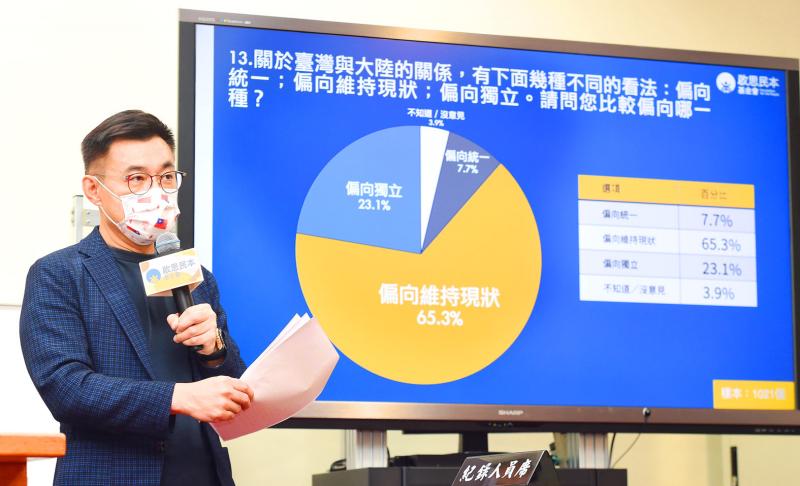More than 65 percent of respondents supported extending compulsory military service to one year amid heightened Chinese military activity, a Foundation for the People poll showed yesterday.
Chinese Nationalist Party (KMT) Chairman Johnny Chiang (江啟臣), who is chairman of the foundation, announced the results at a news conference in Taipei attended by foundation chief executive officer Huang Tzu-che (黃子哲), retired air force lieutenant general Chang Yen-ting (張延廷) and National Chengchi University professor Huang Kwei-bo (黃奎博).
Taiwan in 2018 started its transition to a voluntary military system, with men who fit the criteria required to undergo four months of military training, which was shortened from one year.

Photo: Liao Chen-huei, Taipei Times
More than half of respondents said that a year of mandatory military service should be reinstated, while 12.9 percent said that the four-month regime should be kept, 5 percent said it should be eight months and 4.6 percent said it should be 10 months, the survey showed.
Asked about national security strategies, 61 percent said that trade across the Taiwan Strait can relieve tensions, while 29.2 percent said it makes Taiwan more reliant on China, the survey showed.
Asked whether Taiwan should bolster its military deterrence capabilities or diplomatic efforts in the face of military threats from Beijing, 55.9 percent of respondent said both were necessary, 24.7 percent said only the latter was needed, 9.6 percent said that only the former was needed and 6.6 percent said that neither was needed, it showed.
Regarding the visit of US House of Representatives Speaker Nancy Pelosi to Taiwan last week, 45.1 percent said it caused more harm than good, 27.4 percent said the opposite and 22.9 percent thought it had pros and cons, the survey showed.
Seventy-seven percent of respondents said that the government should notify the public if Chinese missiles fly over Taiwan, while 11.8 percent were against such notifications, it showed.
The public is generally unsatisfied with the government when it comes to national security, which might be due to the way it has responded to the most recent Chinese military drills, Chiang said, adding that the government should announce the activities of the Chinese People’s Liberation Army to put people’s minds at ease.
Asked about their stance on cross-strait relations, 7.7 percent of respondents were prounification, 65.3 percent preferred the “status quo” and 23.1 percent were proindependence.
The poll was conducted from Friday to Sunday by sending out questionnaires on Facebook and collecting 1,021 valid responses from people over the age of 18. It has a confidence level of 95 percent and a margin of error of 3.07 percentage points.

Taiwan is stepping up plans to create self-sufficient supply chains for combat drones and increase foreign orders from the US to counter China’s numerical superiority, a defense official said on Saturday. Commenting on condition of anonymity, the official said the nation’s armed forces are in agreement with US Admiral Samuel Paparo’s assessment that Taiwan’s military must be prepared to turn the nation’s waters into a “hellscape” for the Chinese People’s Liberation Army (PLA). Paparo, the commander of the US Indo-Pacific Command, reiterated the concept during a Congressional hearing in Washington on Wednesday. He first coined the term in a security conference last

Prosecutors today declined to say who was questioned regarding alleged forgery on petitions to recall Democratic Progressive Party (DPP) legislators, after Chinese-language media earlier reported that members of the Chinese Nationalist Party (KMT) Youth League were brought in for questioning. The Ministry of Justice Investigation Bureau confirmed that two people had been questioned, but did not disclose any further information about the ongoing investigation. KMT Youth League members Lee Hsiao-liang (李孝亮) and Liu Szu-yin (劉思吟) — who are leading the effort to recall DPP caucus chief executive Rosalia Wu (吳思瑤) and Legislator Wu Pei-yi (吳沛憶) — both posted on Facebook saying: “I

The Ministry of Economic Affairs has fined Taobao NT$1.2 million (US$36,912) for advertisements that exceed its approved business scope, requiring the Chinese e-commerce platform to make corrections in the first half of this year or its license may be revoked. Lawmakers have called for stricter enforcement of Chinese e-commerce platforms and measures to prevent China from laundering its goods through Taiwan in response to US President Donald Trump’s heavy tariffs on China. The Legislative Yuan’s Finance Committee met today to discuss policies to prevent China from dumping goods in Taiwan, inviting government agencies to report. Democratic Progressive Party Legislator Kuo Kuo-wen (郭國文) said

Sung Chien-liang (宋建樑), who led efforts to recall Democratic Progressive Party (DPP) Legislator Lee Kun-cheng (李坤城), was released on bail of NT$80,000 today amid outcry over his decision to wear a Nazi armband to questioning the night before. Sung arrived at the New Taipei District Prosecutors’ Office for questioning in a recall petition forgery case last night wearing a red armband bearing a swastika, carrying a copy of Adolf Hitler’s Mein Kampf and giving a Nazi salute. Sung left the building at 1:15am without the armband and covering the book with his coat. Lee said today that this is a serious